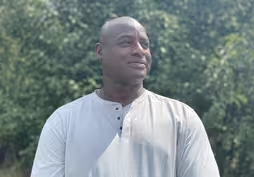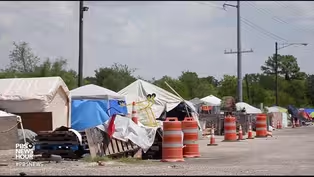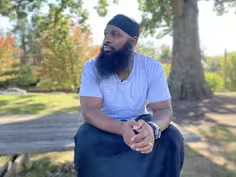
Searching For Justice | Part 3
Special | 7m 55sVideo has Closed Captions
Changing the criminal justice system on behalf of children
PBS NewsHour exposes the real-life struggles facing formerly incarcerated Americans as they reenter their communities.
Problems playing video? | Closed Captioning Feedback
Problems playing video? | Closed Captioning Feedback
Major corporate funding for the PBS News Hour is provided by BDO, BNSF, Consumer Cellular, American Cruise Lines, and Raymond James. Funding for the PBS NewsHour Weekend is provided by...

Searching For Justice | Part 3
Special | 7m 55sVideo has Closed Captions
PBS NewsHour exposes the real-life struggles facing formerly incarcerated Americans as they reenter their communities.
Problems playing video? | Closed Captioning Feedback
How to Watch PBS News Hour
PBS News Hour is available to stream on pbs.org and the free PBS App, available on iPhone, Apple TV, Android TV, Android smartphones, Amazon Fire TV, Amazon Fire Tablet, Roku, Samsung Smart TV, and Vizio.
Providing Support for PBS.org
Learn Moreabout PBS online sponsorshipMore from This Collection
PBS NewsHour exposes the real-life struggles facing formerly incarcerated Americans as they reenter their communities.
Searching For Justice | Part 4
Video has Closed Captions
How drug testing in Alabama holds former prisoners back from creating a new life (5m 35s)
Searching For Justice | Part 2
Video has Closed Captions
The vicious cycle of incarceration and homelessness (7m 12s)
Searching For Justice | Part 1
Video has Closed Captions
Free from prison after 23 years, but facing new challenges during the pandemic (9m 37s)
Providing Support for PBS.org
Learn Moreabout PBS online sponsorshipJUDY WOODRUFF: Now we continue our series on the challenges facing former prisoners with Bryan Stevenson, founder of the Equal Justice Initiative.
Kelly Corrigan, who's host of PBS' "Tell Me More," spoke to Stevenson about his life's work and what he believes Americans should be talking about around their dinner table.
It's part of our special series Searching For Justice.
KELLY CORRIGAN: Once in a generation, someone comes along and holds up a giant mirror and asks us to look at the totality of who we are as a country.
That's the story of Bryan Stevenson's life, a Harvard Law School superstar who spent the first 18 months after graduation sleeping on a buddy's couch, so that he could represent people with no money and only the tiniest sliver of hope.
Thirty years later, he's still at it.
Along with his colleagues at the Equal Justice Initiative, he's still taking the kinds of cases he documented so unforgettably and his 2014 bestselling memoir "Just Mercy."
BRYAN STEVENSON, Founder, Equal Justice Initiative: I went to law school because I was concerned about inequality and injustice.
And it didn't seem like those were priorities in my first year of law school.
And it was really only in my second year of law school that things turned around.
I drove down to Jackson, Georgia, which is where death row is.
And they brought this man in, and he had chains everywhere.
And they unchained this man.
And I got so nervous that, when he walked over to me, I just said: "I'm so sorry.
I'm just a law student.
I don't know anything about the death penalty."
(LAUGHTER) BRYAN STEVENSON: "I don't know anything about criminal procedure, but they sent me down here to tell you that you're not at risk of execution any time in the next year."
And I never will forget that man just slowing me down and saying: "Wait, wait, wait.
Say that again."
And I said: "You're not at risk of execution any time in the next year."
And he closed his eyes and he said: "Wait, wait.
Say that again."
And I said: "You're not at risk of execution any time in the next year."
And that's when that man grabbed my hands.
And he looked me dead in the eye, and he said: "Thank you, thank you, thank you."
And I couldn't believe how, even in my ignorance, just being present, just showing up could make a difference in the quality of someone's life.
And it taught me something really important about being present, about proximity.
He started to sing: "I'm pressing on the upward way.
New heights, I'm gaining every day, still praying as I'm onward bound."
And then he said: "Lord, plant my feet on higher ground."
And when I heard that man sing, everything changed for me.
That's when I knew I wanted to help condemned people get to higher ground.
And in that instant, my interest in the law was radicalized.
It's so clear to me that we are all more than the worst thing we have ever done.
I think, if someone tells a lie, they're not just a liar, and they should not have to go through life branded only as a liar.
I think, if someone takes something, they're not just a thief.
I think, even if you kill someone, you're not just a killer.
And we can't do justice until we understand the other things you are.
We have a generation of kids, poor kids, that, by the time they're 5, have trauma disorders, what you're trying to do with kids is, you're trying to make them feel human again.
But when you're told you're a prisoner, when you're told you're worthless, when you have been condemned to die in prison, you're basically being told, your life has so little meaning, so little purpose, so little value, we're not going to let you have that life.
And, for me, it's allowing people to be human, despite the tragedy of a past crime or despite the tragedy of the injustice, despite the tragedy of what we have done to people.
And, with kids, that's especially so.
I never pretended to be just their lawyer.
I - - they didn't want me to be just their lawyer.
And I never tried to pretend that that was my role: I'm just this professional.
You know, a lot of my young clients need me to be a brother or a dad or uncle or whatever.
And I embrace that, because I believe, to be an effective advocate, I have to go with where they are.
KELLY CORRIGAN: So, tell me -- you got kind of laser-focused on some changes in the system on behalf of kids.
And you won a huge Supreme Court case.
BRYAN STEVENSON: Yes.
I mean, after 20 years of representing people on death row, we won a case that ended the death penalty for children.
Roper v. Simmons in 2005 banned the execution of children.
And when we told them they weren't going to be executed, it wasn't joy.
It's like, oh, I'm just going to die in prison instead.
It's life without parole.
It was a different kind of death sentence.
And I recognized that that wasn't right either.
So, we quickly began thinking about, now that we have kind of eliminated that problem, how do we -- how do we think about challenging life without parole for children?
KELLY CORRIGAN: And it is like - - it is a death sentence.
BRYAN STEVENSON: Yes.
However harsh life without parole is for an adult, it's doubly hard for a 13-year-old or a 14-year-old.
That means their time of incarceration will be even longer.
It's just so irrational, right, because we don't let kids drink, and we don't let kids smoke because we recognize that children are changing, they're evolving.
Their maturity hasn't fully arrived yet.
The children I was representing, places like Florida, who had been convicted were getting harsher sentences than adults who had committed the same crime, because we were fascinated with this idea of a super predator child.
And that's how we then created this legal landscape where every state in the country lowered the minimum age for trying children as adults.
There are 13 states that have no minimum age for trying a child as an adult, which means that I have represented 9-year-old kids facing adult sentences, decades of adult imprisonment.
KELLY CORRIGAN: What conversations do you feel like every family could be having around the dinner table right now?
BRYAN STEVENSON: We have got the highest rate of incarceration in the world, and nobody seems to give any thought to that.
You know, having six million people on probation and parole really paralyzes whole sectors of our community.
That we have 70 million Americans that have criminal arrest histories, and that then makes it harder for them to get loan or jobs, is a real crisis.
KELLY CORRIGAN: Right.
BRYAN STEVENSON: When the Bureau of Justice said in 2001 the projection is that one in three Black male babies born is expected to go to jail or prison, that was shocking.
But what was even more shocking was the absence of any reaction.
And that's what's so difficult because we are capable of responding to a threat to our lives.
We're in that response mode now in this pandemic.
When we go to the doctor, we don't want the doctor to just tell us about one part of the disease.
We need to know everything.
But, somehow, in the justice context, we act as if there's a limit to how much we should know or understand.
And that's just not healthy.
And part of the way that I think our nation will recover from our 400-year history of injustice, of racism and bigotry is if we find the courage to embrace it all, to hear it all.
KELLY CORRIGAN: So, a thing that you talk about a lot is the ways that we affect one another.
BRYAN STEVENSON: Yes.
KELLY CORRIGAN: And I just want to say that you have had a tremendous effect on me and my kids, and I'm super grateful.
BRYAN STEVENSON: Well, thank you.
That means a lot.
So, I appreciate that.
JUDY WOODRUFF: So much to think about.
And thank you, too, Bryan Stevenson and Kelly Corrigan.

- News and Public Affairs

FRONTLINE is investigative journalism that questions, explains and changes our world.

- News and Public Affairs

Amanpour and Company features conversations with leaders and decision makers.












Support for PBS provided by:
Major corporate funding for the PBS News Hour is provided by BDO, BNSF, Consumer Cellular, American Cruise Lines, and Raymond James. Funding for the PBS NewsHour Weekend is provided by...


